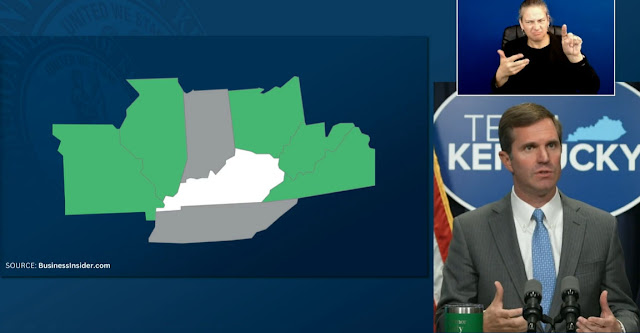 |
| Beshear displayed a map showing in green the adjoining states where medical cannabis is legal. |
Kentucky Health News
Kentuckians who meet a detailed set of requirements would be able to possess up to 8 ounces of marijuana for medical use starting Jan. 1, under an executive order Gov. Andy Beshear signed Tuesday.
The drug would have to be bought in a state where the sale of cannabis is legal, and the person would need the receipt and a certification from a health-care provider saying that they have at least one of 21 specific conditions, including cancer, epilepsy, Parkinson's disease, Crohn's disease, sickle-cell anemia, severe and chronic pain, post-traumatic stress disorder, fibromyalgia, glaucoma or a terminal illness.
Beshear's order is in the form of an advance, conditional pardon. He had not mentioned such a device in his seven months of public deliberation about the issue, which began when the state Senate again refused to hear a House-passed bill to legalize medical cannabis. Republicans control both chambers.
The highest-quality health care is a human right," the Democratic governor asserted. Noting that Kentucky has high rates of cancer and painkiller overdoses, he said "There's another way to manage the pain without the threat of addiction."
Beshear created a Medical Cannabis Advisory Committee that held several public hearings on the issue. It received more than 3,500 comments, 98.6% of which favored of legalizing medical cannabis, he said.
"Kentuckians are leaving this state to access medical cannabis," he said. "Some of them are leaving this state for good." The drug is legal in 37 states.
One commission member, Justice Secretary Kerry Harvey, said cannabis is "a treatment that's already available to the overwhelming majority of Americans but not Kentuckians," some of whom have declined to use the drug because they don't want to violate the law: "What an awful choice that must be."
Jared Bonvell, a veteran from Northern Kentucky, said his use of cannabis gave him "a change of life that is just absolutely astounding," allowing him to stop taking 13 medications.
Paducah contractor Craig Manley said in a video that nothing took away his pain except THC, the psychoactive ingredient in cannabis.
State and federal law define marijuana as containing Delta-9 THC. Products containing Delta-8 THC, a less potent form, are on the market legally. Beshear signed another order regulating Delta-8 THC and said it would provide the legal framework for regulating cannabis if the legislature legalizes it.
Beshear's cannabis order notes that 8 ounces is the most marijuana that can be possessed under Kentucky law without being a felony, and says the health-care provider's certification "shall not constitute a prescription for medical cannabis."
The order allows the cannabis to be possessed by a caregiver, defined as someone at least 21 and with "significant responsibility for managing the well-being of the individual on whose behalf the cannabis was purchased."
"Today's actions are not substitutes for much-needed legislation," Beshear said. "What we're trying to do is take a measured step to help those who are struggling."
State Rep. Jason Nemes, R-Louisville, who sponsored the unsuccessful bills, called Beshear's order an “unprecedented power grab” that “cannot stand,” WDRB reports, adding, "Nemes says he invites the governor to work with lawmakers to develop a legal medical marijuana program." Beshear said he would keep working to legalize medical cannabis with a law.
John Cheves of the Lexington Herald-Leader reports, "There may yet be legal challenges to Beshear’s actions. House and Senate leaders did not immediately respond to requests for comment Tuesday. But the office of Republican Attorney General Daniel Cameron, who often clashes with Beshear, said he’s studying the orders."
No comments:
Post a Comment